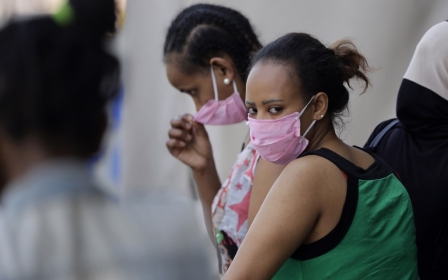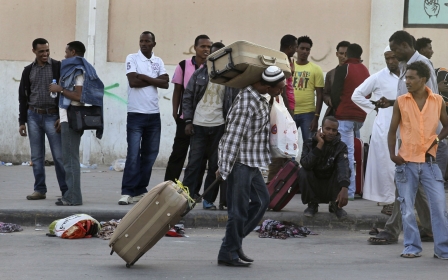Ethiopia strands its citizens in Lebanon by tripling price of repatriation
Ethiopia has tripled the price of repatriation for its citizens in Lebanon to $1,450, including flights and mandatory quarantine, further prohibiting the return of dozens of women stranded and destitute outside its Beirut consulate.
State-owned Ethiopian Airlines, the only carrier currently flying to Ethiopia from Lebanon, says the price tag includes costs for flights and a two-week quarantine in one of the 23 hotels designated by the Addis Ababa government to hold returnees amid the coronavirus pandemic.
Yet women repatriated from Lebanon in May told Middle East Eye that the government had previously quarantined hundreds of returnees at a university campus free of charge.
The new fare linked to the quarantine has only exacerbated problems for the nearly 40 Ethiopian women who have been abandoned by their Lebanese employers outside the Beirut consulate, as they watch any savings they may have dwindle as the local currency nosedives.
Economic issues
New MEE newsletter: Jerusalem Dispatch
Sign up to get the latest insights and analysis on Israel-Palestine, alongside Turkey Unpacked and other MEE newsletters
An estimated 150,000 Ethiopian women work in Lebanon, with the vast majority in jobs that pay them as little as $150 a month.
But with Lebanon experiencing a devastating economic crisis that has seen the Lebanese pound lose around 70 percent of its value in recent months, hundreds of domestic workers have been laid off en masse or have had their salaries withheld.
Last month, amid much fanfare, the Ethiopian government repatriated more than 650 women who had been abandoned by their Lebanese employers and requested their repatriation. Most of the initial requests came from women fleeing abusive employers in October but steadily rose as the economic situation worsened in Lebanon.
At first, the Ethiopian government charged each passenger a $550 fee to be repatriated.
Hanna, one of those repatriated from Lebanon in May, said she was quarantined at the Addis Ababa University's science and technology campus in the Kality district, on the outskirts of the capital.
"Why can't they turn the university dorms into emergency facilities?" Hanna, who is still in the dormitory, asked Middle East Eye.
"It's madness to expect people in Lebanon to afford the quarantine hotels. They brought us here, why can't they bring the others here after us? They are suffering terribly."
Ethiopians are given the right to work in Lebanon via the kafala system, a controversial system of sponsorship that ties the worker's legal residency to their employers.
The system has come under scrutiny in recent years for leaving workers vulnerable to exploitation and abuse.
Reflecting on her own experience, Hanna said that her wages had been reduced three months ago and described the situation as "stressful".
"My employer had financial difficulties and grew irritated with me. I'm glad I am in Addis Ababa now, or I might have been outside the consulate as well," she said.
Deteriorating situation
The situation in Beirut, meanwhile, continues to deteriorate. Earlier this week, local activists and aid workers put up tents to house the dozens of women forced to sleep outside the consulate.
Last week, Lebanon's labour ministry said it provided temporary shelter for 35 Ethiopian domestic workers who had been left abandoned by their employers.
“I raised my employer’s two children for nearly two years,” Mahlet, an Ethiopian worker who has spent four nights sleeping outside the consulate, told MEE.
“The children loved me and almost saw me as their mother. And yet, their parents just tossed me out here and made me feel worthless," she added.
"My employer told me the consulate would pay for my flight, I was their responsibility. But here they won’t even let me in the door. So I’m just rotting here.”
Banchi Yimer, the founder of Egna Legna, an NGO supporting Ethiopian workers in Lebanon, said the mandatory quarantine costs have already had a "negative impact" on domestic workers.
"In the past, many girls who were abused [by their employers] or had their salary withheld could ask to be sent home. Abusive employers would use the withheld pay to purchase a ticket and send them back," she told MEE.
"But now, that option is off the table as no one can afford the ticket price. This means many will remain indefinitely in cycles of abuse with no alternative."
According to Yimer, some women in extremely desperate situations were willing to sacrifice years of salary to escape abuse or deplorable living condition, but now even that wouldn't be enough to pay for the ticket home.
"It's simply unfeasible. The hopelessness born from this reality is linked directly to an increase in depression and suicide attempts among Ethiopian domestic workers in Lebanon," she said.
Claudine Maakaroun, a Lebanese employer of two Ethiopian women, echoed Yimer's sentiment and said the additional quarantine costs have made the situation more complicated.
"The return ticket to Addis Ababa used to cost a maximum of $250. I have two Ethiopians in my home. Are they expecting me to pay almost $3,000 when there is a dollar shortage in the country?" Maakaroun asked.
"For sure people will drop their workers off at the embassy. We're not responsible for their quarantine hotel stay. Once they are in Ethiopia, it is the Ethiopian government's responsibility to care for them."
It remains unclear how Ethiopian Airlines set the fixed price of $1,450 for return flights from Lebanon, and whether the Ethiopian government itself set the amount. However, the hotels are charging the government, which is likely in turn handing the costs over to repatriated citizens.
A manager from the Ethiopian Skylight Hotel in Addis Ababa, one of the designated quarantine hotels, said that a $125 per night charge was the lowest price the company could offer.
"We set the current prices at a discount to support people during these times. We consider this a national duty. It isn't done with our business interests in mind," the manager, who wished to remain anonymous, told MEE.
A spokesperson from the Ethiopian Foreign Ministry denied that it was charging passengers for their quarantine and said that travellers entering Ethiopia would be quarantined "free of charge."
The spokesperson added that it was working with the Lebanese government and paid for a shelter to be created for Ethiopian workers abandoned by their employer in Beirut.
Ethiopian Airlines refused to respond to multiple requests for comment made to its offices in Beirut and Addis Ababa.
Sara, another Ethiopian worker who is in quarantine at Addis Ababa University's science and technology campus, said she stopped getting paid in US dollars after the currency crisis began in Lebanon.
She was let go and forced to move into a one-room apartment with eight other women. They ran out of food twice and would have starved without the help of local NGOs like Egna Legna.
"I used up my savings and borrowed money to register for repatriation. I'm glad I registered," Sara recalls.
"I would never have been able to afford the ticket and quarantine stay, even if I was working."
Middle East Eye delivers independent and unrivalled coverage and analysis of the Middle East, North Africa and beyond. To learn more about republishing this content and the associated fees, please fill out this form. More about MEE can be found here.




